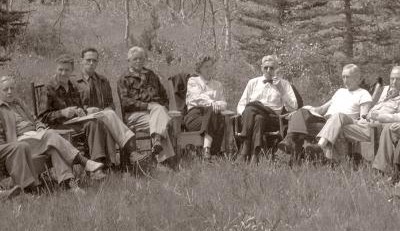90 years ago today, The Wilderness Society was formed by an “organization of spirited people who will fight for the freedom and preservation of the wilderness.” Fast forward to modern times and the society has successfully aided in the establishment of 111 million acres of wilderness in 44 states. READ about their early years… (1935)

By the year 1935, the wild places of the continent had firmly taken hold in Americans’ conscious identities. However while the National Parks system had proved a popular and commercial success, there was less emphasis on general wilderness. The Society sought to change that.
In their early years they took on specific legal and activist roles, for example the blocking of a dam from being built on the Green River in Dinosaur National Monument, but it was in 1953 that the group’s great achievements began to be realized.
Wilderness Society President Olaus Murie, activist Mardy Murie, and others began working to permanently protect the northeastern corner of Alaska, which was already being called “the last great wilderness.” Seven years later, President Dwight D. Eisenhower followed their lead by protecting the Arctic National Wildlife Refuge.
In 1956, a Pennsylvania-born Wilderness Society leader named Howard Zahniser wrote the first draft of legislation to protect wilderness areas across America. Over the next eight years, Zahniser’s bill was rewritten or resubmitted 66 times and subject to 18 public hearings and 16,000 pages of testimony.
In 1964, President Lyndon Johnson signed The Wilderness Act to create a way for Americans to protect their most natural and unspoiled wildlands for future generations. The act immediately put 9.1 million acres of land into the National Wilderness Preservation System and set the framework for decades of wilderness conservation.
MORE Good News on this Date:
- The first Monte Carlo Rally takes place (1911)
- Albania declared itself a republic (1925)
- Operatic tenor Placido Domingo, one of the famous trio known as “The Three Tenors,” turns 83 today (1941)
- US President Jimmy Carter pardoned nearly all American Vietnam War draft evaders, some of whom had emigrated to Canada (1977)
- Production of the iconic DeLorean sports car begins in Dunmurry, Northern Ireland, United Kingdom (1981)
- Pope John Paul II began his first visit to Cuba (1998)
- A 73-year-old hardware store was inundated with customers when a grassroots “cash mob” delivered a boost to the local family-owned Ohio business (2012)
- The Women’s March for civil rights drew more than a million marchers in D.C. and around the US (2017)
On this day 43 years ago, B.B. King donated his personal collection of up to 20,000 blues records to the University of Mississippi to help establish The Blues Archive at their Center for the Study of Southern Culture. The U-Miss Blues Archive is the largest of its kind in the country, and one of the largest in the world, having since grown to hold 70,000 blues, jazz, and other southern music records. B.B. King’s collection is a solid item amid the shimmering mass of vinyl and CDs, includes thousands of posters, images, and other pieces of memorabilia, and is occasionally pulled out for a radio special.

“You can tell a lot about a man by his record collection. While working on the radio show ‘Highway 61’ with Bill Ferris (first director of Southern Studies and the Blues Archive), I was able to look and pull from B.B.’s collection. It featured thousands of LPs. I felt I learned more about him looking through his collection; I could figure out what kind of music excited and influenced him,” said Brett Bonner who worked at the archive.
Bonner said he found foreign language books in the collection so King could speak simple phrases to international audiences, but also different guitar techniques books, and even a pilot’s guide, as the man could fly a plane.
7,000 items in his collection were kept from King’s days as a disc jokey at WDIA in Memphis during the 1950s. Others are head-scratchingly rare albums recorded in the dawn of blues by artists so unknown they don’t even have a Wikipedia page. The entire archive is available on the Ole’ Miss.edu website. (1982)

110 years ago today, the Kiwanis club was formed in Detroit, Michigan, as a networking group for young professional businessmen, but it turned into so much more. Today, Kiwanis International is in 96 nations with 550,000 members who dedicate themselves to serving children and improving the world.
Joe Prance, a tailor, was the first businessman to say yes to the idea conceived by organizer Allen S. Browne. These days, Kiwanis clubs host nearly 150,000 creative service projects each year, raising more than $100 million annually to support community causes and the Kiwanis Children’s Fund, which fights poverty, improves literacy, and offers mentoring. (1915)

39 years ago today, the first National Hugging Day was celebrated, founded by a minister and social services worker in Michigan.
The Hugging Day website named “Most Huggable in 2006” Jana Doolittle of Clio, Michigan, a third-grade teacher at Carter Elementary who asks her class daily “Does anyone need a hug today?” Watch the popular Free Hugs music video. (1986)
And Happy Birthday to the smart, and sporty actress Geena Davis, who turns 69 today.
The actress, most known for her role in Thelma and Louise and A League of Their Own, won an Academy Award for Best Supporting Actress for The Accidental Tourist in 1988. The Mensa member who has campaigned for more and better women’s roles in children’s programming also fronts the Women’s Sports Foundation. Davis was one of 300 women who vied for a semifinals berth in the US Olympic archery team and placed 24th just two years after being introduced to the sport. In 2007 she was honored for her work on gender in the media, receiving the Hollywood Hero award – WATCH that video, here. (1956)
104 years ago today, Agatha Christie’s first novel was published in the UK, The Mysterious Affair at Styles. The book introduced the character of Hercule Poirot, a bombastic Belgian detective who was one of the British crime writer’s most famous and long-running characters, appearing in 33 novels, 2 plays, and more than 50 short stories.

Inspector Poirot last appeared in Curtain: Poirot’s Last Case, published in 1975—and, with that end, Poirot became the only fictional character to receive an obituary on the front page of The New York Times.
For decades, Agatha Christie found the character to be “insufferable” and “detestable”, yet the public loved him so she refused to kill him off. She believed it was her duty to produce what the public liked. In fact, on the famous ITN television series, the actor David Suchet portrayed Poirot, and his death in the final week was too much for the public who loved him—and is the least–watched episode, with some refusing to view it. WATCH a montage of the show… (1921)

And, on this day in 1968, Jimi Hendrix recorded his version of the Bob Dylan song All Along the Watchtower. Sitting in on the session at Olympic Studios in London, just six months after Dylan’s original recording, were Brian Jones from the Rolling Stones and Dave Mason from Traffic. The single by the Jimi Hendrix Experience peaked at No.20 on the US charts and was ranked 47th in Rolling Stone magazine’s 500 Greatest Songs of All Time. WATCH him perform it live…
SHARE the Memories, Milestones, and Music…




















